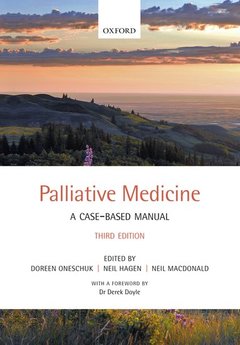Description
Palliative medicine: a case-based manual (3rd Ed.)
A case-based manual
Coordinators: Oneschuk Doreen, Hagen Neil, MacDonald Neil
Language: English
Publication date: 03-2012
416 p. · 17.3x24.5 cm · Paperback
Out of Print
416 p. · 17.3x24.5 cm · Paperback
Out of Print
Description
/li>Contents
/li>Biography
/li>
Palliative care is now an integral part of the undergraduate medical curriculum. Medical education across the board is adopting a case-based approach. This book uses a series of cases to illustrate critical points in palliative medicine. The case-studies have been carefully chosen to reflect real life clinical practice. The contributors illustrate, through the case studies, the desired skills, attitudes, and knowledge required in this field of medicine. Since publication of the second edition, many approaches to palliative care have been further refined and developed. Ongoing research has led to the improved use of existing medications, and the development of several new treatments. More is known about the psychosocial existential distress experienced by patients and their families resulting in an improved understanding by health care providers of how best to approach and assist those affected by advanced illness, and more is known about methadone and other medications with emerging uses. The third edition of this highly popular book continues to offer a panoramic view of palliative care. It introduces a number of new topics including Neurological Disorders, The Last Days, and Palliative Sedation.
Communication. 1. Communication in advanced illness. Interprofessional Care. 2. Interprofessional collaborative practice in palliative care. Pain. 3. Pain assessment and management. 4. Bone pain. 5. Neuropathic pain. 6. Methadone and other novel treatments for pain. Anorexia-cachexia-rehabilitation-fatigue. 7. Anorexia-cachexia. 8. Cancer rehabilitation and fatigue. Respiratory problems. 9. Dyspnea. Mouth care. 10. Mouth care. Gastrointestinal problems. 11. Nausea and vomiting. 12. Constipation. 13. Malignant bowel obstruction. Ethical issues. 14. An approach to ethical issues. Psychosocial and spiritual issues. 15. Suffering in patients and families. 16. Anxiety and depression. 17. Spiritual care. Sleep. 18. Sleep. Palliative care in non-malignant disorders. 19. Cardiac disease. 20. End-stage renal disease. 21. Neurological disorders. 22. HIV/AIDS. Paediatric palliative care. 23. When palliative care involves children: critical conversations and pain and symptom highlights. Lymphoedema. 24. Lymphoedema. Wounds in advanced illness. 25. Wounds in advanced illness. Genitourinary symptoms. 26. Genitourinary symptoms. Delirium. 27. Delirium. Palliative sedation. 28. Palliative sedation. Palliative care in the intensive care unit (ICU). 29. Palliative care in the intensive care unit (ICU). Complementary and alternative therapies in cancer/Integrative oncology. 30. Complementary and alternative therapies in cancer/Integrative oncology. The last days. 31. The last days.
Neil MacDonald, Founding Director, Cancer Nutrition - Rehabilitation Program, McGill University, Montreal, Quebec, Canada and Professor of Oncology, McGill University Doreen Oneschuk, Palliative Medicine Physician, Associate Professor, Division of Palliative Medicine, Department of Oncology, University of Alberta, Edmonton, Alberta, Canada Neil Hagen, Professor, Division of Palliative Medicine, Department of Oncology, University of Calgary, Alberta, Canada
© 2024 LAVOISIER S.A.S.




